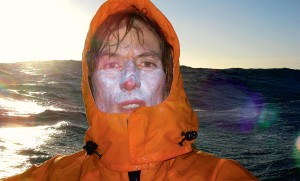Sync: Going solo to explore an adventurer’s mind
 A new documentary combines talking heads and actual footage from a man’s tragic adventure. Peter Galvin explores the filmmaker’s passion for the material.
A new documentary combines talking heads and actual footage from a man’s tragic adventure. Peter Galvin explores the filmmaker’s passion for the material.
In December 2006, an adventurer called Andrew McAuley attempted to cross the Southern Ocean of the Tasman Sea, alone in a kayak, covering the stretch of 1600 kilometres (about 1000 miles) that lays between Australia and New Zealand – which experts describe as wild and lonely, with gigantic swells and stupendous storms.
McAuley, a one time mountain climber accustomed to severe conditions, took with him not just a plan and equipment to combat the extreme conditions, but also a camera to record the journey. Even before losing sight of the Australian coast, McAuley broke into tears. He confessed to his video diary that he was worried that he might die and he would never see his wife Vicki or young son Finlay again. Two days later, wracked with hypothermia and frost bite, he turned back. Six weeks later, he tried again.

